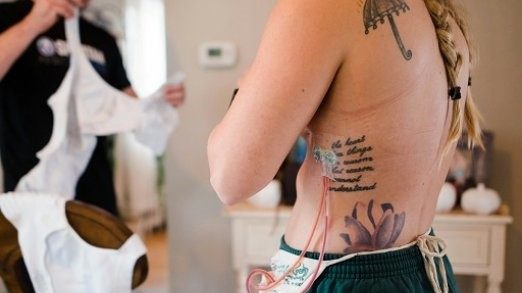
A new study by the University of Ottawa shows more women under the age of 50 are being diagnosed with breast cancer.
The research, led by Dr. Jean Seely, was published in the Canadian Association of Radiologists Journal. The report looks at breast cancer cases over 35 years to shed light on detection in Canada.
Using data from the National Cancer Incidence Reporting System, the Canadian Cancer Registry and Statistics Canada the team looked at all women aged 20 to 54 who were diagnosed with breast cancer.
The research shows over the decades cancer diagnoses have been increasing and it’s not because of more screenings.
“This is not related to screening, as we do not perform screening for women under age 40, except for exceptional high-risk women in fewer than 5 per cent of women,” Seely told CityNews Ottawa in an email. “This is due to other factors, not yet known.”
For Chelsea Bland, her experience of being diagnosed at 28 years old started with a self-examination when she discovered a lump.
Fortunately, this led to screenings which detected the diagnosis, now she is two years cancer-free. From her experience, she started a group in Ottawa that provides peer support for younger women who have breast cancer.
“In my support group, I have heard the same story over and over again,” Chelsea said. “Young women are not being taken seriously after they find a lump because they are told they are too young for breast cancer.”
Breast cancer rates increasing
According to the study, for females in their 20s, there were 3.9 cases of breast cancer per 100,000 between 1984 and 1988. Compared to 5.7 cases per 100,000 between 2015 and 2019.
This, the research shows, is a 45.5 per cent increase.
For women in their 30s, there were 37.7 cases per 100,000 people between 1984 and 1988 compared to 42.4 cases between 2015 and 2019 — a 12.5 per cent increase.
There were 127.8 cases per 100,000 for women in their 40s between 1984 and 1988, compared to 139.4 cases between 2015 and 2019. According to the study, this is a 9.1 per cent increase.
The findings showcase the importance of targeting younger women in breast cancer screenings since most efforts focus on women over the age of 50, Seely said in the press release.
“We need to adapt our strategies and policies to reflect these changing trends, ensuring that all women, regardless of age, have access to the information and resources they need to detect and combat this disease,” she said.